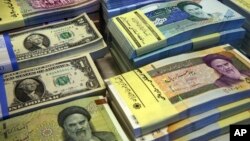Iran is partially lifting controls on the rial’s exchange rate with the dollar to try to ease panic-buying of the U.S. currency, as Washington reimposes economic sanctions related to the Iranian nuclear program.
Beginning Tuesday, Iranian currency exchange houses will be allowed to set their own unofficial exchange rates for customers who need to buy dollars for designated purposes such as overseas travel. Iran’s central bank will continue to set a subsidized, cheaper rate for dollars for buyers of essential imported commodities such as medicines.
Iranian Central Bank chief Abdolnaser Hemmati announced the moves late Sunday. They mark the central bank’s first significant easing of foreign exchange controls since April, when it fixed the rial at a rate of 42,000 to the dollar and banned exchange houses from trading at other rates to try to stop the weakening of the Iranian currency. But the rial continued to lose value on the unofficial market, hitting a record low of 120,000 to the dollar last week. The Iranian currency has since recovered slightly.
The rial has lost half of its value since April due to panic-buying of dollars by Iranians concerned about the impact of U.S. President Donald Trump’s May decision to begin reimposing economic sanctions on Iran as part of his departure from a 2015 nuclear deal between Iran, his predecessor and five other world powers.
Washington will reimpose a first set of Iran sanctions on Tuesday and a second and final set in November, in a bid to pressure Tehran to give up what the U.S. says is its nuclear weapons ambitions. Some foreign companies already have called off deals with Iran to avoid being penalized by those measures. Tehran denies seeking nuclear weapons.
The rial’s slump has made prices of dollar-denominated imports much more expensive for Iranians. Residents of at least a dozen Iranian cities have staged antigovernment protests in the past week to vent their frustrations with soaring inflation and other economic problems.
The Iranian central bank has blamed Tehran’s foreign "enemies" for its currency crisis. But in a Monday interview with VOA’s Persian Service, Foundation for Defense of Democracies analyst Emanuele Ottolenghi said a significant cause of Iran’s economic woes is the government’s own dysfunction.
"Iran is just not a good place to invest, and the (reimposed) U.S. sanctions are only going to make that more pronounced," Ottolenghi said. "The Iranian market is not attractive because of corruption, the opaque nature of the system, insufficient guarantees from the judicial system for investing companies, the regime’s taking of hostages -- including business people coming into Iran -- and a variety of other reasons that are unrelated to sanctions."
Iran has detained a number of Western nationals and dual Iranian-Western citizens in recent years for alleged national security offenses that the governments of those Western nations have rejected.
U.S. economist Steve Hanke of Johns Hopkins University expressed a more skeptical view of the U.S. sanctions strategy in a separate Monday interview with VOA Persian. "The more sanctions you have, the more entrenched will be the current regime in Iran,” he said.
Hanke said sanctions also will create more international criminality. "The Iranians … (will) figure out ways to get around the sanctions, and use criminals engaged in smuggling and other activity to do it."
Gabriele Barbati and Farhad Pouladi of VOA’s Persian Service contributed to this report.




